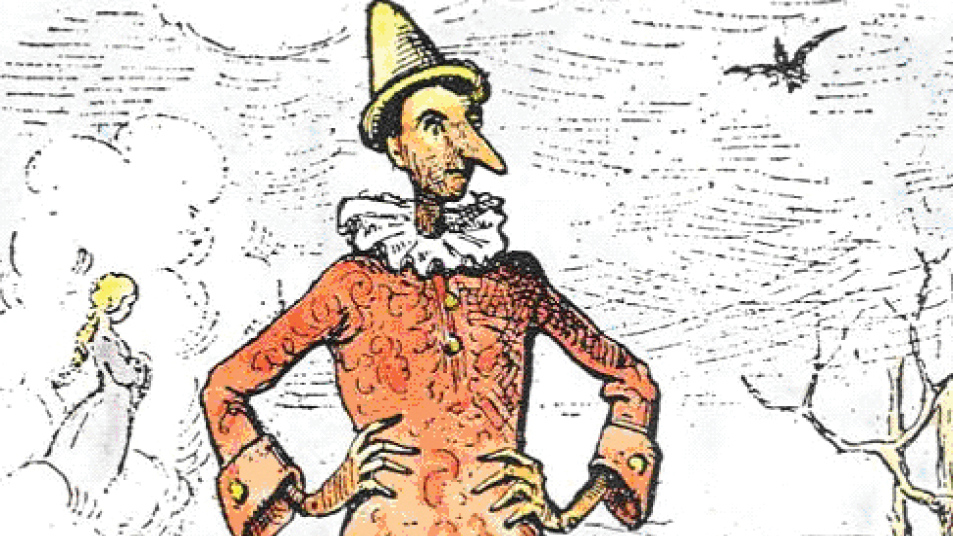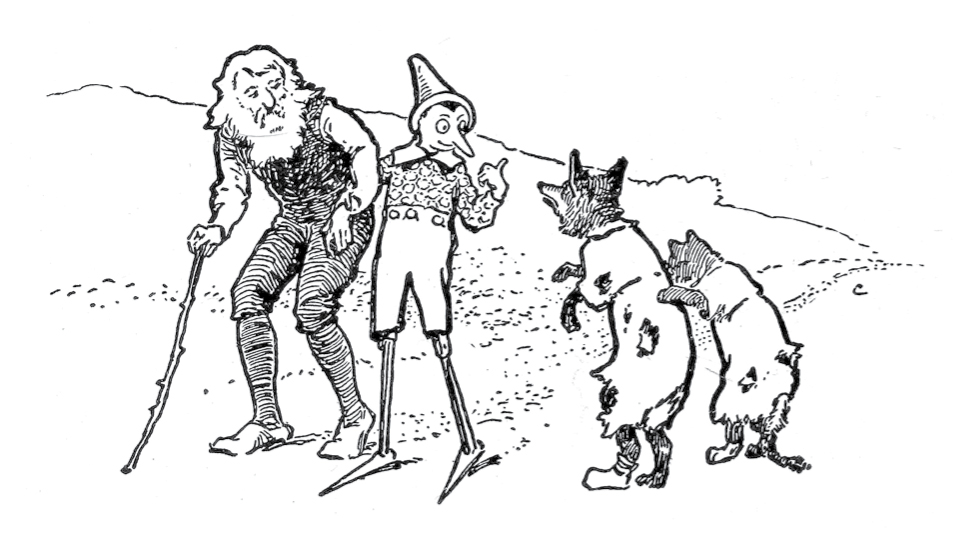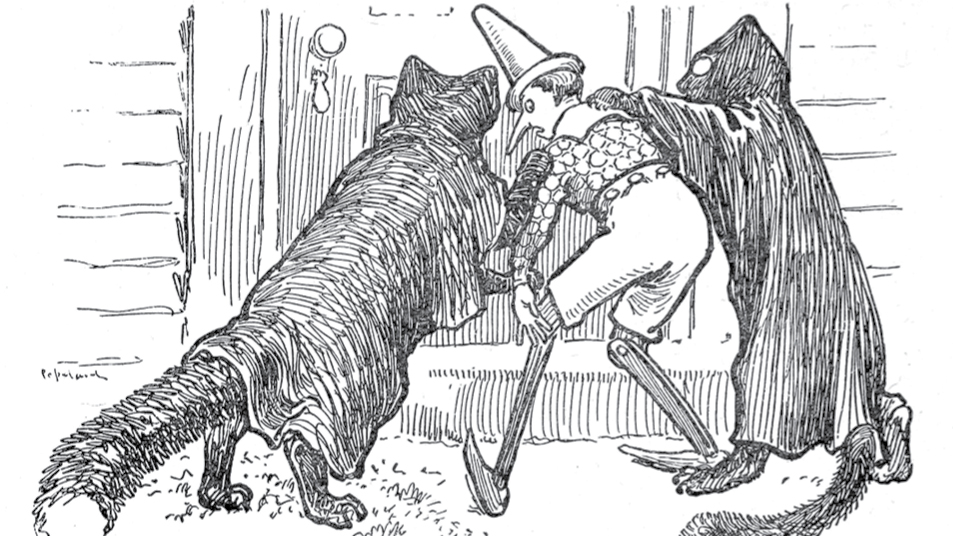Through an exclusive interview with Pinocchio—the (once-)puppet himself—Dr. Carlo Testa, Professor of Italian, unveils the deeper lessons behind this Italian literary classic and why we should take this beloved children’s story seriously.


Illustration by Enrico Mazzanti of The Adventures of Pinocchio written by Carlo Collodi (1883).
“I am not really sure that my story can be fully grasped by children. I have a hunch that adolescents can understand it better; adults, better still; and old people, best. The more one has seen of life, I think, the more one can relate to my story.”
In retrospect, I, Pinocchio, confess that as a child I was immature and blind to the complexities of the world. Later, my heart told me I was on the wrong track. Only very few people grow up without feeling the pangs of youth, the confusion and the uncertainly of life; all others, which are many, will find at least some consolation in my vicissitudes.
This is my story. If you’ve never heard it before or need a refresher, click on the button below. But if you know my story all too well (which in truth very few people do, unfortunately), skip over to my lessons learned—trust me, you don’t want to miss them.
My Selfish Existence
My real father was Carlo Collodi, born in Florence of a family that came from the countryside—the village I have retired to now. He conceived me in early 1881, so, as you can figure out, I am over 141 years old now. My real father entrusted the work of actually making me, in material terms, to my putative father, Geppetto, who was a cabinet maker and lived in a dirt-poor village somewhere in Tuscany. All the Italian countryside was dirt-poor back then, not like now when everyone goes to school and comfortably stays with mama and papa until they marry.
I was a terrible child. I kept playing pranks, I went around begging for money, I squeezed Geppetto of all he would give me, and I showed no gratitude to him or others. The old cricket who lived in the house reproached me for that; I killed it. I loved Geppetto, of course, but only in my thoughts—and I did not think of him much at all, except when I needed him. Instead of going to elementary school, most of the time I was on the run, shunning efforts of all kinds, and avoiding work like the plague: "work" being, to me, a truly indecent four-letter word.
The first major hiccup in my life occurred when I came into some money— five gold coins—from a generous artist-capitalist. Two crooks, the Cat and the Fox, were determined to rob me. First they swindled one coin from me one evening at the Inn of the Red Crab, then, during the same night, they chased me across a forest, beat me up, and hanged me from a tree. That’s the first time I died. (Yes, I died.) End of the first part of my adventures.
A Harsh World
A strange, protective, but also strict blue-haired bambina, Mistress of the Animals, had her furry cohort retrieve my body and put me to bed. She nursed me back to life. When I resurrected (more or less), she asked me where I had put my remaining four coins. Why would she care either way? None of her business! I was caught so off-guard and in the dark about her reasons that I lied to her three times regarding the whereabouts of my gold. That’s when my nose grew and grew.
Anyway, that story did not end well, because then the Cat and the Fox persuaded me to plant my coins to grow in the Field of Miracles so that the coins would grow faster, but later that night they dug up my gold and stole it. Geppetto was right to warn me that there is fraud everywhere in this world!
After that I went to court over this, and the Most Honourable Judge—a Blind Gorilla wearing spectacles without lenses—said that since I had been robbed, I had to go to jail as punishment. Geppetto was right to warn me that there is injustice everywhere in this world!
When an amnesty came and I was freed, I tried to go home to the blue-haired Fairy, but a huge, violent snake crossed my path and sent me tumbling into the mud for no reason at all. Violence is everywhere in this world, as Geppetto kept saying!
Exhausted by such trials and, as usual, starving, I stole some grapes; but the owner of the field caught me, put a chain round my neck, and forced me to work for him as a watchdog against the weasels that had been stealing his chickens. What a dog’s life! At any rate, that’s how I discovered—because the weasels then approached me about this—that the going rate for a watchdog to stay mum about the theft of chickens is 12.5% of the stolen value, not one cent less. Yes, Geppetto was right to warn me that there is nauseating corruption everywhere in this world!
After all this, I finally made it back to the blue-haired Fairy's home in the forest. However, unfortunately she was dead—dead of sorrow over my truancy. Desperate, I set out to look for Geppetto instead. As I was looking for him, I got washed into the high sea and ended up on the Island of the Busy Bees. There—you won’t believe this!— I found the Fairy again, now miraculously transformed into an adult woman. She still had blue hair though. My laziness made me unemployable by any Busy Bee, but she generously hired me as her Aquarius, which is Latin for "water carrier". I also started going to school more or less seriously to make the Fairy happy.
More adventures occurred on the Island, but they all pale in comparison to the third cycle in my life, which would bring about my second death. Ah, life is SO complicated!
A Slave to Capitalism
Just before the schoolyear was out, I was readying myself to celebrate that event by becoming human at last. The Fairy was beside herself with joy, and I was very happy too. But just at that time, my buddy Candlewicked persuaded me to catch the nighttime stagecoach with him to Toyland—Toyland being a place where no schooling ever takes place, and the boys who flee school receive political asylum and are allowed to play 24/7. (Not one girl in Toyland: in Italy in the 1880s girls didn’t go to school, so the lucky things had no need whatsoever to flee from an institution they were carefully kept out of.)
The owner of Toyland was a media tycoon who acted very seductive to us, and with a buttery voice brought us all aboard the stagecoach. And boy, did we all play like mad in Toyland! For a while, at least. After a few months, both Candlewicked and I developed donkey ears, became donkeys, and began to bray.
At that point, things got ugly. The seductive little man sold us as beasts to other exploitative capitalists, and he made a lot of money from selling us. Candlewicked disappeared, and I ended up in a circus. There, for months I was worn down to my bones with work. Then I hurt myself and could not walk. Since I could no longer generate profits, the circus owner sold me to someone else for the mere value of my skin. On this basis, my third owner took me to the sea to drown (to kill me without ruining the hide, that is … How thoughtful of him). He put a rope with a rock around my neck, and drown me he did. (That's right: I died again.)
From ‘Matter’ to ‘Soul’
But, unlike many others, I must have had friends in high places—the blue-haired Fairy, I reckon—and I was allowed to resurrect once more.
New life, vita nuova: a school of fish ate my donkey’s carcass, regenerating me into the wooden puppet I had been before. And then, a puppet once more, floating about aimlessly in the ocean, I was swallowed by a huge awful Shark; inside which I found … Geppetto again!
Geppetto and I managed to escape together and swim to safety. We staggered ashore seeking help, and … lo and behold … the Cricket I had killed a long time before—who had been no less effectively revived than myself—welcomed us into a cute little home belonging to a blue-haired Goat. I think it was an avatar of my sweet blue-haired Fairy!
Well then, so far, so wonderful. But the problem was that Geppetto was sick from the time spent inside the Shark, and he needed money to buy his medicine.
Now listen to the truly unbelievable thing that happened to me after all these painful experiences: all of a sudden I became full of compassion for poor Geppetto and ready to sacrifice myself for him. How so? At a nearby farm, they needed someone to crank the wheel of their well’s water pump, because the donkey that had been doing it for quite some time was on its last leg. So I went for the job interview. It was an absolutely brutal job, paying pennies to boot. But, heck, there was no alternative, and I took it, out of sheer love for Geppetto.
Before getting started, however, I asked to meet the dying donkey out of curiosity. I went to the stable and—you wouldn’t believe it—I saw Candlewicked lying on the straw! In my arms he brayed his last sigh.
About the same time as Geppetto, the Fairy got sick too. She was also in a hospital and needed money, so I gave her the 40 ¢ I had saved up in the hopes of buying myself some new clothes. By then, though, I did not mind this small sacrifice in the least; on the contrary, giving to my loved ones gave me great pleasure.
Shortly thereafter, one night I dreamed of the Fairy: I dreamed that she was forgiving me for all my past trickster’s tricks that had so wounded her. In the future, she prompted me: "Do embrace good judgement and you will be happy." Thus my dream ended.
I asked myself: which future is she alluding to?
The next morning, when I woke up, to my astonishment I observed that my body, my arms, my nose were no longer made of wood, but of flesh and blood. Evidently, during the night the Fairy had somehow worked out my metamorphosis from the stage of 'matter' to the stage of 'soul'. (A good metamorphosis, therefore, the very opposite of Kafka's. I've read it since—it's a great story, but it's all backwards.)
Present Day
As a human being, I finally found my path in the world as a sea captain through the first half of the 20th century. Later I retired, to be exact, in 1946 at age 65; and by now I have had many decades’ time to meditate and study literary, religious and philosophical texts that have changed me completely, giving some cultural rationale to the emotional “lessons of the heart” that I had first experienced—without words attached—at the time of my early “conversion.”
Lessons Learned


Illustration by Charles Copeland (1904) of The Adventures of Pinocchio written by Carlo Collodi (1883).
“The more my selfishness pushed me to shun work, the more of an animal I became. But the moment I freely accepted heavy work out of love for others, I then transmuted from a puppet into a full-fledged human being.”
Compassion
Ever since I transformed from a puppet into a human being, I have never forgotten the lessons taught to me by the wonders worked by love and compassion: yes, the world is a harsh place, but with patience and goodwill, we can cooperate with others and help each other make life bearable, not the hell it can otherwise become. That lesson has changed me dramatically.
The most difficult point is especially this “compassion” business: the fact that the more my selfishness pushed me to shun “beastly” work, the more of an animal I became. But the moment I freely accepted heavy work out of love for others—and accepted “becoming an animal” (a donkey at the well) for that very purpose—I then transmuted from a puppet into a full-fledged human being.
Actually, this “reversal of fortunes” is so philosophically profound that I don’t think even very many old people have understood it!
Challenging a sick society—the right way
Jiddu Krishnamurti once said: “It is no measure of health to be well adjusted to a profoundly sick society.” If the values, the ideals, the practices of society are morally repulsive—”sick”, in Krishnamurti’s terms—then conniving with them can be equally repulsive and sick. “Success” in being good at doing something negative is, itself, a negative factor. So, for a young person to be “misaligned” with such deeply anti-educational parameters is actually a hopeful sign.
It was therefore profound of my father (author) Carlo Collodi to pit me, a selfish and materialistic little creature, against the negative values of capitalism in his times (which were pretty much the same as the capitalism of your times, now in 2022, only on a smaller scale). My life story teaches us that the challenge is to object to unacceptable mainstream parameters (1) without falling into the same trap of selfishness and insensitivity which mar the very world we criticize; and also (2) without remaining marginalized to the point that we are deprived of all agency—i.e. without remaining illiterate puppets or, if you will, stupid donkeys who will be bossed around by other donkeys stupider than ourselves.
Accomplices do well in a bad world; meanwhile, mere victims are in no position to change a bad world into a better one. Finding the right solution, then, is a bit like squaring the circle, and will vary with each of us; but there is no other solution than for each of us to find their own individual answer. No one ever said that life was easy or fair! We can’t become full-fledged individuals if we don’t come to terms with this reality.
Universality


Illustration by Charles Copeland (1904) of The Adventures of Pinocchio (Ch. 15) written by Carlo Collodi (1883).
“What my life story loses in tangible, local, realistic specificity, it gains in its universal human realism.”
Unlike the glorious age of the Roman Republic, the Middle Ages, or the Renaissance, Italy in the 1800s was a kind of backward country, groaning under the yoke of foreign imperialism. France had Paris, England had London, Russia had St. Petersburg, etc., and the most magnificent realistic stories could be molded, in those literatures, according to the real, complex features discernible at that time in those capitals. When my father created my life story, he had no such decadent, glamourous set pieces to predispose all around me: just the drab, dusty environment of the Tuscan countryside, almost completely shorn of actual traits, names, locations, etc.
But the other side of the coin is this: what my life story loses in tangible, local, realistic specificity, it gains in its universal human realism. My life story was endowed with a wealth of human archetypes that are astonishingly true and universal and that we encounter in every place and in every time. The Cricket, the good Fairy, generous Geppetto, the Cat and the Fox (think Wall Street!), Candlewicked, the entertainment mogul owning Toyland (think Berlusconi!), and more: these characters, their contexts, are universal—they belong to all places and all times.
“A sense of loneliness brings about despair; a sense of shared humanity brings consolation.”
My story should be taken very seriously if for no other reason than because to read about other people’s goof-ups can be comforting to many people in their youth—to people who may be as confused as I was in my own youth, and who may be groping for answers, for some kind of hope.
In reading about other people’s sorrows and trespasses, we can put our own in perspective. And if, as is likely, we will still make mistakes, at least we can learn that we are not alone in that predicament, so we can perceive some human comfort and solidarity even in erring. A sense of loneliness brings about despair; a sense of shared humanity brings consolation instead.
Ah, and by the way, I am not really sure that my story can be fully grasped by children; yes, my father wrote it for a children’s magazine, but I don’t think that children can make the most of it. I have a hunch that adolescents can understand it better; adults, better still; and old people, best. The more one has seen of life, I think, the more one can relate to my story.
Professor Carlo Testa will be teaching a UBC course titled “Pinocchio and Everything Else” (course codes: ITAL 333 cross-listed with RMST 343) from January to April 2023.
Professor Carlo Testa recently published a confessional autobiography of Giuseppino “Pinocchio” Collodi in English, which is available on Amazon Kindle under the title I, Pinocchio, the Real and Only One: Confessions of a Former Puppet Who Converted from Matter to Soul (Vancouver: Finisterrae, 2022).


